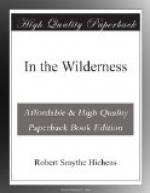Phelps’s theology, like his science, is first-hand. In the woods, one day, talk ran on the Trinity as being nowhere asserted as a doctrine in the Bible, and some one suggested that the attempt to pack these great and fluent mysteries into one word must always be more or less unsatisfactory. “Ye-es,” droned Phelps: “I never could see much speckerlation in that expression the Trinity. Why, they’d a good deal better say Legion.”
The sentiment of the man about nature, or his poetic sensibility, was frequently not to be distinguished from a natural religion, and was always tinged with the devoutness of Wordsworth’s verse. Climbing slowly one day up the Balcony,—he was more than usually calm and slow,—he espied an exquisite fragile flower in the crevice of a rock, in a very lonely spot.
“It seems as if,” he said, or rather dreamed out, “it seems as if the Creator had kept something just to look at himself.”
To a lady whom he had taken to Chapel Pond (a retired but rather uninteresting spot), and who expressed a little disappointment at its tameness, saying, of this “Why, Mr. Phelps, the principal charm of this place seems to be its loneliness,”
“Yes,” he replied in gentle and lingering tones, and its nativeness. “It lies here just where it was born.”
Rest and quiet had infinite attractions for him. A secluded opening in the woods was a “calm spot.” He told of seeing once, or rather being in, a circular rainbow. He stood on Indian Head, overlooking the Lower Lake, so that he saw the whole bow in the sky and the lake, and seemed to be in the midst of it; “only at one place there was an indentation in it, where it rested on the lake, just enough to keep it from rolling off.” This “resting” of the sphere seemed to give him great comfort.
One Indian-summer morning in October, some ladies found the old man sitting on his doorstep smoking a short pipe.
He gave no sign of recognition except a twinkle of the eye, being evidently quite in harmony with the peaceful day. They stood there a full minute before he opened his mouth: then he did not rise, but slowly took his pipe from his mouth, and said in a dreamy way, pointing towards the brook,—
“Do you see that tree?” indicating a maple almost denuded of leaves, which lay like a yellow garment cast at its feet. “I’ve been watching that tree all the morning. There hain’t been a breath of wind: but for hours the leaves have been falling, falling, just as you see them now; and at last it’s pretty much bare.” And after a pause, pensively: “Waal, I suppose its hour had come.”
This contemplative habit of Old Phelps is wholly unappreciated by his neighbors; but it has been indulged in no inconsiderable part of his life. Rising after a time, he said, “Now I want you to go with me and see my golden city I’ve talked so much about.” He led the way to a hill-outlook, when suddenly, emerging from the forest, the spectators saw revealed the winding valley and its stream. He said quietly, “There is my golden city.” Far below, at their feet, they saw that vast assemblage of birches and “popples,” yellow as gold in the brooding noonday, and slender spires rising out of the glowing mass. Without another word, Phelps sat a long time in silent content: it was to him, as Bunyan says, “a place desirous to be in.”




